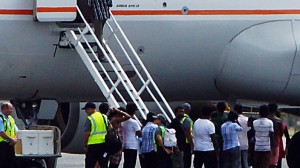Plan for Tassie refugee hub floated

A group of asylum seekers get on board an airplane at Cocos (AAP Image/ Brad Waugh)
A plan to make Tasmania the national hub for assessing refugee claims will be submitted to the federal government by a group of business and community leaders.
The group called Tasmania Opportunity, comprising professionals, business people and community groups, has compiled a detailed proposal that would see asylum seekers’ claims processed in the island state.
Under the proposal, a detention would be capped at one month, but asylum seekers would have to remain in Tasmania afterwards.
Asylum seekers would be allowed to study and work in the Tasmanian community, receive Centrelink benefits but they would have live where the Government determined the greatest benefit for the local economy was.
“It is a plan to transition Australia’s offshore asylum-seeker processing from three extremely expensive current locations to the obvious smarter, cheaper, safer option – Tasmania,” the group’s website said.
The Group’ proposal said an injection of $1billion a year would relieve pressures on the state’s health, education, infrastructure and development budgets whilst increasing consumer spending and the size of the state economy.
“This plan would strengthen existing Government agencies and service organisations, enhancing outcomes for all Tasmanians and interstate visitors,” the proposal said.
“There would be a focus on capacity-building investment and empowering small enterprises across multiple sectors, including agriculture, industry, tourism and arts,” the group says.
A recent Summit meeting in Launceston, held by the group, heard from human rights lawyer and refugee advocate Julian Burnside, QC.
Mr Burnside, who recently won this year’s Sydney Peace Prize, said: “The Tasmania Opportunity is a necessary, responsible, safe, humane, and compassionate response to the current global refugee crisis.”
Mr Burnside told the Summit that asylum seekers should be seen as a resource, not a threat. He said the Federal Government spent $5 billion a year on asylum seekers, and that Tasmania was a much more cost-effective option.
“If you can reduce that cost dramatically to one-tenth of what it is at the moment, and in the process avoid doing harm to frightened people and do some good for the Tasmanian economy, that seems a good thing all round,” he said.
“They would be bringing in to the community not only their courage and their initiative but also the income that they can earn.”
Mr Burnside said there were some conditions that should be attached to any planned move to make Tasmania a refugee processing centre.
He said asylum seekers would still be detained on arrival for one month only, for health and security screening.
Cesira Colleluori
AMES Staff Writer












